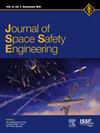人造空间物体重返轨道:对上层大气和人员安全的不利影响
IF 1.7
Q3 ENGINEERING, AEROSPACE
引用次数: 0
摘要
回顾了2010年至2023年发生的受控和非受控再入轨道。除去5架航天飞机轨道飞行器,重新进入大气层的总质量超过4400公吨。在2019-2023年的五年期间,可控再入占返回质量的近62%,其中仅猎鹰9号第二级就占31%,而未受控制的完整物体和大型碎片再入占剩余的38%。2023年,轨道再入质量以气体和微粒的形式分散在上层大气中,接近600公吨。假定所有小于300公斤的物体完全消失,与卫星、轨道级和大型碎片不受控制的再入有关的地面伤亡概率每年变化,从2010年的0.8%到2023年的3.5%。在2023年,70%的伤亡概率与轨道级有关,20%与卫星有关,10%与大型碎片有关。本文章由计算机程序翻译,如有差异,请以英文原文为准。
Orbital re-entries of human-made space objects: Drawbacks for the upper atmosphere and the safety of people
The controlled and uncontrolled orbital re-entries occurred from 2010 to 2023 were reviewed. Excluding five Space Shuttle orbiters, the total mass re-entered into the atmosphere exceeded 4400 metric tons. In the five-year period 2019-2023, controlled re-entries accounted for nearly 62 % of the returned mass, including 31 % from Falcon 9 second stages alone, while uncontrolled re-entries of intact objects and large debris were responsible for the remaining 38 %. In 2023, the orbital re-entry mass dispersed as gas and particulate in the upper atmosphere was close to 600 metric tons.
The ground casualty probability associated with the uncontrolled re-entry of satellites, orbital stages and large debris varied, on an annual basis, from 0.8 % in 2010 to 3.5 % in 2023, assuming the complete demise of all objects of less than 300 kg. In 2023, 70 % of the casualty probability was associated with orbital stages, 20 % with satellites and 10 % with large fragments.
求助全文
通过发布文献求助,成功后即可免费获取论文全文。
去求助
来源期刊

Journal of Space Safety Engineering
Engineering-Safety, Risk, Reliability and Quality
CiteScore
2.50
自引率
0.00%
发文量
80
 求助内容:
求助内容: 应助结果提醒方式:
应助结果提醒方式:


